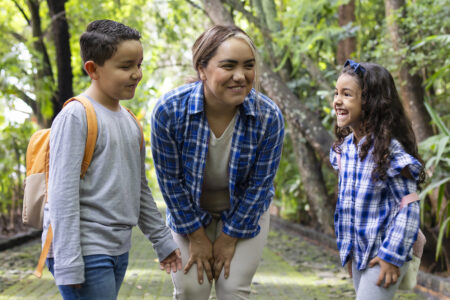
Share On Social!
Mother’s Day is a time to celebrate the women who raised us, cared for us, and put our needs above their own.
Now, it’s time to take care of her.
Whether you’re a first-time mom or have a few kiddos under your belt, here are four health and wellness resources for mothers.
1. National Maternal Mental Health Hotline
Launched on Mother’s Day 2022, the National Maternal Health Hotline is a free, 24/7, confidential hotline that supports women, before, during, and after pregnancy via phone call or text.
The hotline was designed to help combat maternal mortality and severe maternal morbidity crisis in the US by connecting women to counselors, including licensed health care professionals, certified educators, and specialists.
These counselors listen to the needs of the caller and direct them to local support groups and organizations, or other health care professionals.
They tackle issues such as pregnancy concerns, like breast feeding, depression, anxiety, feeling overwhelmed, or having relationship conflicts.
Within the first 11 months of the hotline’s launch, nearly 12,000 pregnant and postpartum women and their loved ones received support, according to the Health Resources and Services Administration (HRSA).
The National Maternal Mental Health Hotline is available in English and Spanish with translation services in over 60 languages.
The hotline can be reached at 1-833-TLC-MAMA (1-833-852-6262).
2. Breastfeeding Resources
Mothers are responsible for so much when it comes to raising a baby, including feeding.
While research shows breast-fed babies have lower risks of asthma, childhood leukemia, childhood obesity, ear infections, and more, breastfeeding can be challenging to master.
In fact, it can take a toll on mothers both mentally and physically.
That’s why there are several resources available for mothers struggling with breastfeeding.

For instance, the U.S. Breastfeeding Committee (USBC) offers a library of learning opportunities with webinars, toolkits, and reports.
They also provide reference materials on a variety of changes that leaders can make to support breastfeeding, while supplying resources for lactation support providers, emergency responders, and parents.
Another breastfeeding resource is La Leche League International (LLLI) , which helps mothers in the breastfeeding trenches by providing support, encouragement, information, and tips from other mothers.
Online support groups are also available through LLLI in English and Spanish.
They also provide information on breastfeeding, breastfeeding in public places, foods for nursing parents, latching and more.
For a complete list of resources, ways to volunteer and donate, and learn more about the LLLI, visit their website.
For more breastfeeding resources visit the Salud America! website.
3. Special Supplemental Nutrition Program for Women, Infants, and Children (WIC)
The Special Supplemental Nutrition Program for Women, Infants, and Children (WIC) is a federal food and nutrition program run by the US Department of Agriculture (USDA).
The program helps low-income infants, children up to 5, and women who are pregnant, breast-feeding, or postpartum with nutritional needs.
Assistance comes in the form of providing access to certain foods, nutrition education, and health and community service referrals.
WIC food “packages” allow participants to obtain foods that provide specific nutrients for pregnancy, growth, and development.
WIC exists as a way to improve maternal health outcomes by providing nutrition support during pregnancy and postpartum periods, which is shown to improve the dietary intake of pregnant and postpartum women.
“Nutrition plays a large role in supporting improved maternal health outcomes,” said Dr. Jamila Taylor, president and CEO of the National WIC Association (NWA), in a news release.
More than 6.2 million women, infants, and children participate in WIC, according to a Salud America! resource.
Visit the USDA website for more information about WIC, including eligibility requirements and how to apply. Or check out an extensive list of breastfeeding resources available through the program.
4. Keep Physically Fit Through Pregnancy and Postpartum
Staying physically active throughout pregnancy and after giving birth is vital to ensure the health of both mother and baby.
That means meeting the recommended weekly physical activity guidelines.
For pregnant women that looks like at least 150 minutes (2 hours, 30 minutes) of moderate aerobic activity every week during and after pregnancy, according to the Centers for Disease Control and Prevention (CDC).
The CDC recommends activities that are safe for pregnant women, including brisk walking, yoga poses, water aerobics, and stationary bike riding.
There are several benefits to being physically active while pregnant or postpartum.
Women who are pregnant can benefit from reducing the risk of excessive weight gain, gestational diabetes, pre-eclampsia, and helps with postpartum depression symptoms, according to the US Department of Health & Human Services.
Keeping up with daily physical activity can also improve self-esteem, lower risk for anxiety, and help with aches and pains, including constipation, varicose veins, backaches, and exhaustion.
Long-term impacts of daily physical activity can help women recover faster from labor and cut down on their risk for preterm delivery and postpartum depression.
Find more activities and physical activity recommendations for your age and/or health condition.
Rally for Health Improvement for Mothers and Children
You and your family’s health should be a top priority.
But is it a priority for your community?
Where you live, work, play, and go to school can determine a lot about you and your family’s health.
Download a Health Report Card by Salud America! at UT Health San Antonio.
The report card gives you an individualized look at where your community stands on important health issues such as access to maternal care and green spaces for your family to play.
Email the report card to local change makers in your community, share it on social media to show just cause why change should happen, or use it to raise awareness on certain issues and topics impacting where you live!
Explore More:
Healthy Families & SchoolsBy The Numbers
142
Percent
Expected rise in Latino cancer cases in coming years



